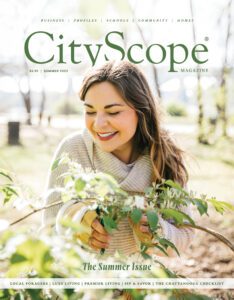(first) Photo by Nick Rader (second) Photo by Chris Loizeaux
TREKKA
Travel pants that pull double duty
Nick Rader is an international traveler who once took a six-month motorcycle drive from South Africa to Norway wearing a single pair of pants, a fashion move he hoped could transition from Mount Kilimanjaro in the daytime to a club at night. (Spoiler: He looked rough.) Chris Loizeaux is a local graphic designer, apparel designer, and former owner of a local fly-fishing shop who has visited 45 states for backpacking and water sports. The pair first met when rain had them stuck in a cabin, and they became fast friends drinking beer and sketching their vision for the perfect adventure and travel pant.
The problem with typical outdoor pants, Loizeaux says, is bulk. Pockets, seams, and zippers are placed at angles and locations that give the appearance of function but actually aren’t functional at all. Trekka’s first apparel product is The Traveler Pant, a lightweight chino with 16 features in the fabric, including four-way stretch, bug repellant, quick dry, UV protection, and odor resistance. In lieu of cargo pockets, The Traveler features two hidden zipper pockets directly behind the main pockets.
Loizeaux and Rader also invented a neodymium magnetic button that offers the pants the ability to stretch while sitting. The result: a simplified, streamlined look that actually can transition from the trail to, perhaps, a date with ease. “We stripped our product down to the absolute basics and then rebuilt it in a way that didn’t require all the seams and zippers,” Loizeaux says. “It’s the fabric that really performs. We want something that is clean, classy, and going to stand the test of time.”
Both Rader and Loizeaux say Chattanooga is an ideal location for adventure because of its extensive river systems and creeks, as well as accessibility to trailheads and regional international airports. Building their brand locally also pays tribute to the city’s strong background in the textile industry. “It’s kind of a no-brainer to stay in our hometown,” Loizeaux adds. “We wouldn’t leave because we want to stay here and play. It’s a perfect extension of where we want to be and what we want to do, and it matches with the products we are developing.”
“We come from it with a lot of experience in owning pants that underperform but are overdesigned,” says Chris Loizeaux of Trekka. “We wanted a good classic design that doesn’t change year in and year out.”





